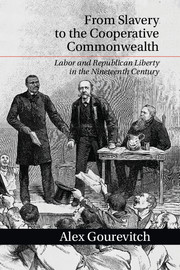Book contents
1 - The Paradox of Slavery and Freedom
Published online by Cambridge University Press: 05 December 2014
Summary
No legislator of antiquity ever attempted to abrogate slavery;
on the contrary, the people most enthusiastic for liberty –
the Athenians, the Lacedemonians, the Romans, and the Carthaginians
– were those who enacted the most severe laws against their serfs.
Voltaire
Voltaire’s assault on ancient liberty, which forms the epigraph to this chapter, contains a familiar liberal criticism of the classical republics. The “most enthusiastic” advocates of liberty in the classical republics were some of the most ardent slave-owners. A half-century and a French Revolution later, Benjamin Constant plowed the same ground: “[W]ithout the slave population of Athens, 20,000 Athenians could never have spent every day at the public square in discussions.” Polemical as these formulations were, they carried a strong grain of truth, enough to worry modern inheritors of republican ideas. Some, including slave-owners in the American South, bit the bullet and defended their peculiar institution on the grounds that they were the true defenders of republican liberty. As John C. Calhoun, a Senator from South Carolina who served for seven years as Vice President, put it, “I fearlessly assert that the existing relation between the two races in the South ... forms the most solid and durable foundation on which to rear free and stable political institutions.” Even after the abolition of slavery in the United States, the compatibility of slavery and republican liberty remained a guiding concern. George McNeill’s The Labor Movement: The Problem of To-day, an authoritative collection of late nineteenth-century views on the labor question, opened with the observation that, “in Greece and Rome slavery was recognized as a fundamental institution of the state – the absolute condition of any progress in the arts and sciences.” It is “not likely to be true” that “the free citizens of the Roman Empire supported themselves in agriculture by their own labor without the assistance of slaves.”
However they judged ancient society, many modern republicans knew they faced a particular kind of conflict between freedom and equality. It appeared to any interpreter of republican liberty that the independence of free citizens presupposed the dependence of slaves. Yet, if freedom could not be enjoyed by all, if some had to be slaves so that others could be free, then respect for human equality required abandoning republican liberty.
- Type
- Chapter
- Information
- From Slavery to the Cooperative CommonwealthLabor and Republican Liberty in the Nineteenth Century, pp. 18 - 46Publisher: Cambridge University PressPrint publication year: 2014



